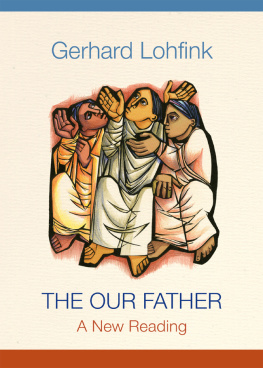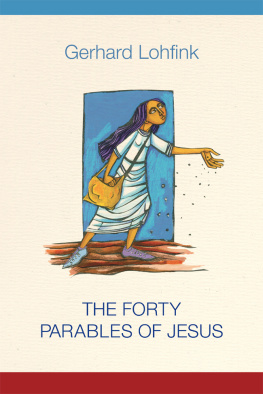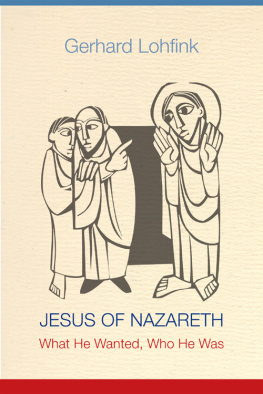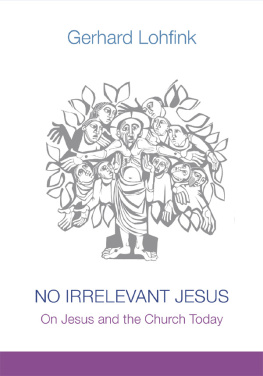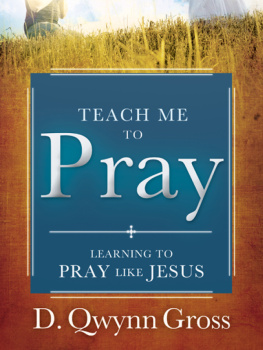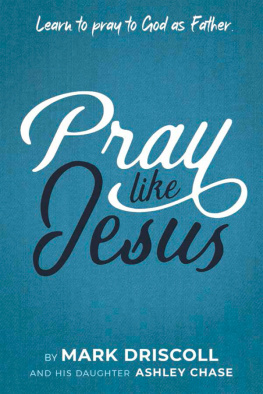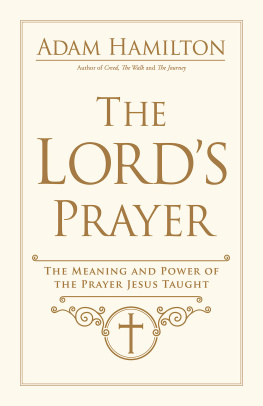Discussion of the correct translation and meaning of the sixth petition in the Our Father (lead us not into temptation) is unending, and it has taken on a new life in our time. It shows how important the Our Father is to many Christians. They want to understand it. They want to know what they are really praying for.
This book is intended to serve that need. I ask about the original meaning of the Lords Prayer because it is only when we are clear about what it meant in that time that we can apply it in our current situations.
I dedicate this little book to my brother Norbert: for good reasons! We have often talked about the right interpretation of the Our Father. On two occasions we have joined together to address conferences on our reading of it. In preparing for those conferences I learned a great deal from my brother about the Old Testament background of the prayer, and that whole process has contributed to this book. It is a tiny token of gratitude for many mutual discussions.
I owe thanks also to my former student, Dr. Linda Maloney, who has applied her thorough knowledge of the state of the exegetical problem to the translation of the book. I hope it will help many people to enjoy praying the Our Father and to increase in their love for Jesus.
1. The Curious Form of the Our Father
T HE OUR FATHER is probably the prayer most often prayed throughout the world. But it is anything but a universal prayer. It is first of all and primarily a prayer for Jesus disciples. Matthew places it at the center of the Sermon on the Mountwhich is, as its introduction shows, addressed not only to the people in general but first and primarily to Jesus disciples (cp. Matt 5:1-2). Luke makes it quite clear who the addressees are: in his gospel one of Jesus disciples asks him:
Lord, teach us to pray, as John taught his disciples. (Luke 11:1)
But it is not only because of this information in Matthew and Luke that we know the Our Father as primarily a prayer for disciples. Its content shows that as well. This is clearest in the fourth petition, for bread, which seems to reflect the bitter situation of day laborers in Palestine and with it the misery of all the hungry and needy of this world. In reality the request for bread comes from the specific situation of Jesus disciples, which had to do with their duty to preach and proclaim, as we will see in the next chapter.
The Our Father is primarily a prayer for disciples. Every line is about disciples forgetting their own desires and plans for their lives and desiring only what God wills. In that sense it is a dangerous prayer for anyone who prays it.
Far too often the Our Father is misused: as prayer-stuffing, as a liturgical measure of time (Pause for the length of an Our Father), or as a penance after confession (For your penance, say one Our Father and one Hail Mary).
People in the early church were still aware of how precious an Our Father is. Only at the completion of the catechumenate was it handed over; that is, candidates for baptism were first introduced to the Our Father shortly before their baptism. This was called the traditio orationis. After baptism they were then permitted, for the first time, to recite the Our Father in the festal Mass, together with the whole congregation. Just as catechumens were solemnly presented with the Creed, so also they solemnly received the Our Father.
For us, the Our Father has often become routine. It is worn out. Its words and phrases are as blurred as a foggy landscape. Hallowed be your name, Your will be doneit has all become vague. But on the lips of Jesus and in the ears of the disciples the Our Father had clear, sharply defined contours.
Now, to make those contours visible again, we will first say something about the form of the Our Father. The form of a text is never accidental. It is related to the subject, to what it is about. Here are five observations about the form of the Our Father:
1. The Our Father is pure petition.
It is universally accepted today and needs no further proof that the doxology for the kingdom and the power and the glory are yours, now and forever was only secondarily added to the Our Father. The oldest manuscripts do not yet contain a doxology. It probably comes from a time when the Our Father had become part of the eucharistic celebration. The original Our Father was nothing but petition.
Why didnt Jesus teach his disciples a doxology, a prayer of praise? Or a prayer like the beginning of the Jewish Eighteen Benedictions, the Tefillah? The Tefillah opens with:
Blessed are you, O Lord our God and God of our fathers, the God of Abraham, the God of Isaac and the God of Jacob, the great, mighty and revered God, the Most High God who bestows lovingkindnesses, the creator of all things, who remembers the good deeds of the patriarchs and in love will bring a redeemer to their childrens children for his names sake. O king, helper, savior and shield. Blessed are you, O Lord, the shield of Abraham.
So why did Jesus not teach his disciples a prayer that was at least framed by praise, as is Israels daily prayer? There is only one plausible explanation: the urgent crisis and need of the people of God. The Our Father is like a cry, begging that God will intervene. Obviously, Jesus knew every kind of prayer, if only from the Psalter. He knew praise, thanksgiving, lament. But

